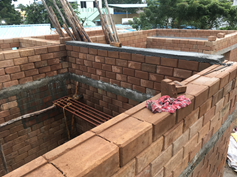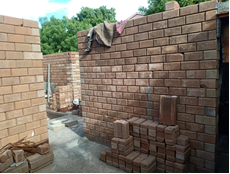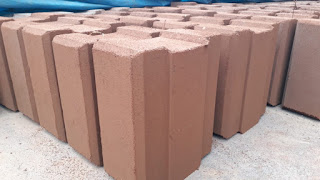"Mud Interlock Blocks: Revolutionizing Sustainable Construction"
- Introduction:
The incorporation of Mud Interlock Blocks in construction
signifies a major leap forward in sustainable building practices. Comprising
primarily of soil, these blocks utilize an innovative interlocking concept for
wall construction, eliminating the need for traditional binding materials. The
connection between blocks is achieved through a "lip and groove"
arrangement, commonly referred to as a "free joint."
Benefits:
a)
Enables faster wall construction.
b)
Easy to handle, reducing the overall cost of
construction.
c)
Applicable for both load-bearing and framed
structures.
d)
Effective in temperature variation, maintaining
room temperature.
e) Simplicity in adjusting wall thickness during construction.
2. Understanding Mud Interlock Blocks:
Composition: Mud Interlock Blocks are made from a
combination of natural soil, sand, and cement.
Cement-induced hydration strengthens the blocks, eliminating
the need for traditional brick kiln firing.
Unlike conventional walls, no external materials are
required for the hardening process.
The interlocking system negates the need for mortar between
blocks, streamlining the construction process.
Mud blocks have lips and grooves along the face, ensuring a
perfect and effortless locking system.
The wall construction process is simple, maintaining
high-quality standards.
3.
Advantages:
a)
Environmental Benefits:
Reduces carbon footprint during manufacturing.
Eliminates the need for cement mortar in wall construction, further
reducing environmental impact.
b)
Cost-Effectiveness:
Faster construction reduces time and costs.
Exposed walls eliminate the need for inner and outer face
plaster.
c)
Insulation and Energy Efficiency:
Improved insulation properties and energy efficiency.
Greater temperature control, maintaining internal
temperature.
d)
Quality and Finishing:
Enormous quality and finishing of the wall.
4.
Structural Strength and Durability:
Achieves Great structural strength (8 to 9 N/mm2) with minimal water
absorption (10-11%), surpassing normal bricks.
Project pics
5.
Challenges and Solutions:
a. One of the main challenges in constructing walls with mud
interlock blocks is the need for skilled workers.
b. To ensure high-quality and efficient wall construction, a
solution lies in providing training within a short time frame. This approach
can transform individuals into highly skilled workers capable of handling the
intricacies of mud interlock block construction.
6.
Applications in the Construction Industry:
a)
Suitable for load-bearing wall construction.
b)
Ideal for framed structure partition walls,
serving both as internal partitions and external walls.
c)
The exposed surface of external walls enhances
the aesthetic appeal of the structure.
7.
Environmental Impact:
Highlight the positive environmental impact of mud interlock
blocks, emphasizing the reduction in the construction carbon footprint and the
promotion of sustainable building practices.
8.
Opinion:
a)
The construction of walls using mud interlock
blocks not only ensures greater quality and efficiency but also contributes to
sustainability by reducing carbon footprints in future construction practices.
b)
This technology yields superior outcomes,
ensuring the highest quality in building wall construction. It significantly
reduces the time required for wall construction
9.
Conclusion:
a)
Mud interlock block construction is a
significant step toward sustainable construction practices, providing
substantial results.
b)
The adoption of these blocks not only reduces
carbon footprints but also ensures the construction of high-quality walls,
marking a positive shift in the construction industry's environmental impact.





Comments
Post a Comment